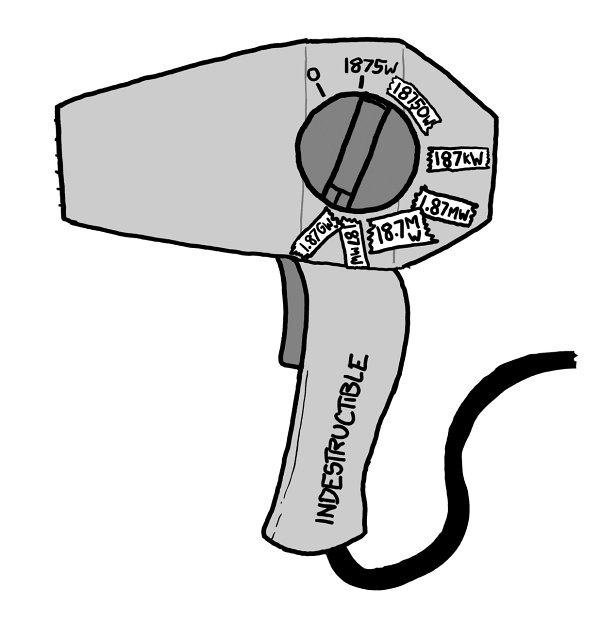What If? (9 page)
Authors: Randall Munroe

- 1
“One mole” is close to the number of atoms in a gram of hydrogen. It’s also, by chance, a decent ballpark guess for the number of grains of sand on Earth.
- 3
Th
at’s a neat coincidence I’ve never noticed before
—
a cubic mile happens to be almost exactly
4/3π cubic kilometers, so a sphere with a radius of X kilometers has the same volume as a cube that’s X miles on each side.
- 4
No relation.
Hair Dryer
Q.
What would happen if a hair dryer with continuous power were turned on and put in an airtight 1
×
1
×
1-meter box?
—Dry Paratroopa
A.
A typical hair dryer
draws 1875 watts of power.
All 1875 watts have to go somewhere. No matter what happens inside the box, if it’s using 1875 watts of power, eventually there will be 1875 watts of heat flowing out.
Th
is is true
of any device that uses power, which is a handy thing to know. For example, people worry about leaving disconnected chargers plugged into the wall for fear that they’re draining power. Are they right? Heat flow analysis provides a simple rule of thumb: If an unused charger isn’t warm to the touch, it’s using less than a penny of electricity a day. For a small smartphone charger, if it’s not warm
to the touch, it’s using less than a penny a
year
.
Th
is is true of almost any powered device.
1
But back to the box.
Heat will flow from the hair dryer out into the box. If we assume the dryer is indestructible, the interior of the box will keep getting hotter until the outer surface reaches about 60°C (140°F). At that temperature, the box will be losing heat to the outside as fast as the
hair dryer is adding it inside, and the system will be in equilibrium.
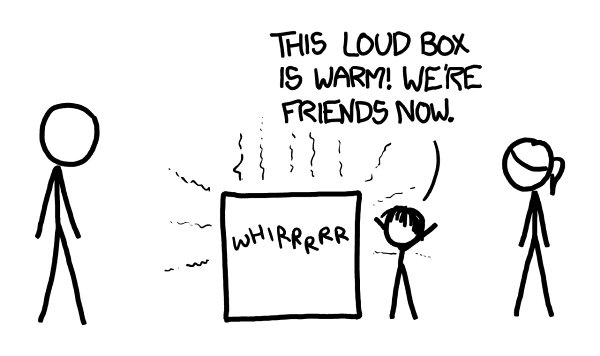
It’s warmer than my parents! It’s my new parents.
Th
e equilibrium temperature will be a bit cooler if there’s a breeze, or if the box is sitting on a wet or metallic surface that conducts away heat quickly.
If the box is made of metal, it will be hot enough to burn your hand if you touch it for more than five seconds. If it’s wood, you can probably touch it for a while,
but there’s a danger that parts of the box in contact with the mouth of the hair dryer will catch fire.
Th
e inside of the box will be like an oven.
Th
e temperature it reaches will depend on the thickness of the box wall; the thicker and more insulating the wall, the higher the temperature. It wouldn’t take a very thick box to create temperatures high enough to burn out the hair dryer.
But let’s assume it’s an indestructible hair dryer. And if we have something as cool as an indestructible hair dryer, it seems like a shame to limit it to 1875 watts.
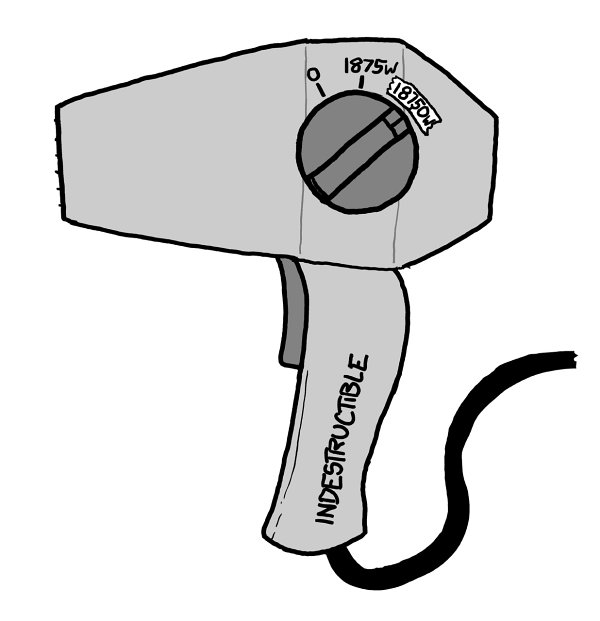
With 18,750 watts flowing out of the hair dryer, the surface of the box reaches over 200°C (475°F), as hot as a skillet on low-medium.
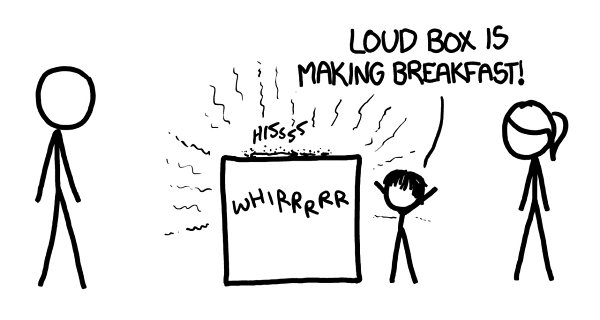
I wonder how high this dial goes.
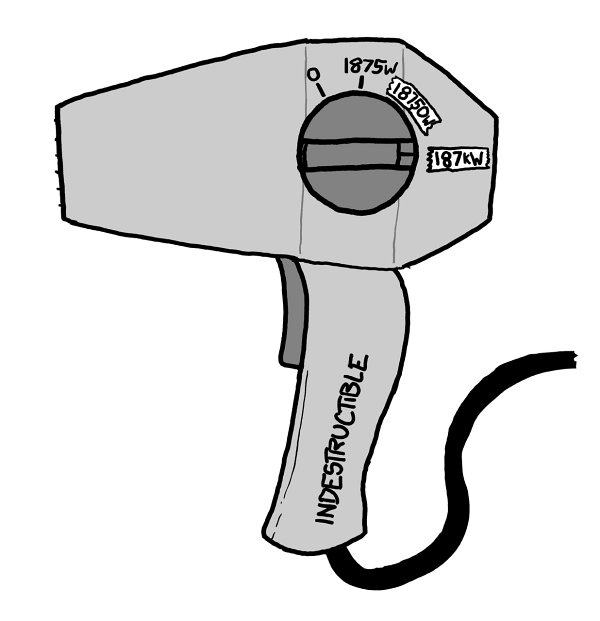
Th
ere’s a distressing amount of space left on the dial.
Th
e surface of the box is now 600°C, hot enough to glow a dim red.
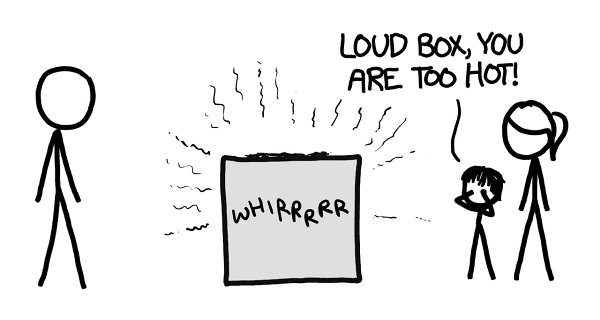
If it’s made of aluminium, the inside is starting to melt. If it’s made of lead, the outside is starting to melt. If it’s on a wood floor, the house is on fire. But it doesn’t matter what’s happening around it; the hair dryer is indestructible.
Two megawatts pumped into a laser is enough to destroy missiles.
At 1300°C, the box is now about the temperature of lava.

One more notch.

Th
is hair dryer is probably not up to code.
Now 18 megawatts are flowing into the box.

Th
e surface of the box reaches 2400°C. If it were steel, it would have melted by now. If it’s made of something like tungsten, it might conceivably last a little longer.
Just one more, then we’ll stop.
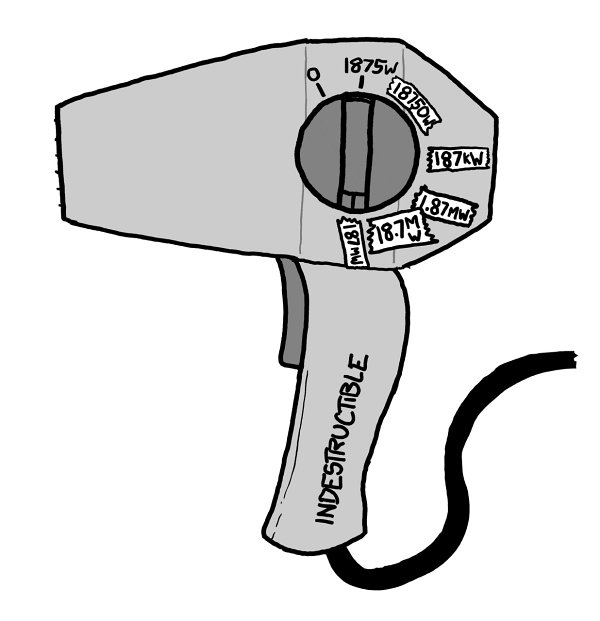
Th
is much power
—
187 megawatts
—
is enough to make the box glow white. Not a lot of materials can survive these conditions, so we’ll have to assume the box is indestructible.

Th
e floor is made of lava.
Unfortunately, the floor isn’t.
Before it can burn its way through the floor, someone throws a water balloon under it.
Th
e burst of steam launches the box out the front door and onto the sidewalk.
2
